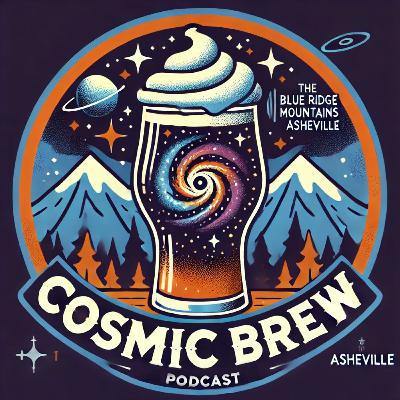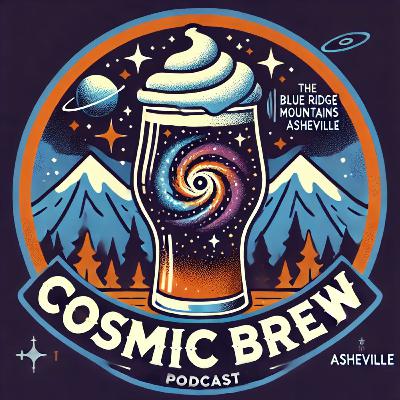Discover Cosmic Brew
Cosmic Brew

Cosmic Brew
Author: Luis Chavarria - Astronomer
Subscribed: 2Played: 3Subscribe
Share
© Luis Chavarria - Astronomer
Description
Cosmic Brew is a short and engaging astronomy podcast that blends science with everyday curiosity, delivering cosmic wonders in under three minutes. With a warm tone, a dash of humor, and the occasional pop culture reference, it makes the mysteries of the universe feel as familiar as your favorite local brew.
Cosmic Brew's main theme was composed by Andres Ramirez and Luis Chavarria.
Cosmic Brew's main theme was composed by Andres Ramirez and Luis Chavarria.
8 Episodes
Reverse
In this episode of Cosmic Brew, we explore light pollution—what it is, how it impacts astronomy, wildlife, and human health, and what we can do about it. From confused moths and off-course birds to sea turtle hatchlings lured away from the ocean and disrupted human sleep cycles, the effects of artificial lightingstretch far beyond the night sky. But the good news? With smarter lighting choices, we can protect ecosystems, our health, and the stars above.Want to know more?Learn about night pollinators and how light pollution affects them:https://www.nifa.usda.gov/about-nifa/blogs/pollination-day-or-nighthttps://www.sciencedirect.com/science/article/pii/S0167880923001342 See a database study on light pollution’s impact on migratory birds:https://environmentalevidencejournal.biomedcentral.com/articles/10.1186/s13750-021-00246-8Discover the effects of light pollution on sea turtles:https://www.sciencedirect.com/science/article/abs/pii/S0025326X24002236Explore how human health is affected by light pollution:https://darksky.org/resources/what-is-light-pollution/effects/human-health/Get tips on how to reduce light pollution in your community:https://darksky.org/resources/what-is-light-pollution/light-pollution-solutions/
The Euclid mission is opening an extraordinary new window on the Universe by delivering images of more than 10 million galaxies, allowing scientists to study how cosmic structure has evolved over the last 10 billion years. By mapping galaxies across time, Euclid helps us probe the mysterious 95% of the Universe made up of dark matter and dark energy, the unseen forces shaping how galaxies form and how the Universe expands. What makes this effort especially exciting is that anyone can take part: through the Galaxy Zoo project, people around theworld can help classify galaxies and directly contribute to cutting-edge cosmology, turning curiosity into real scientific discovery.The European Space Agency’s official Euclid page explains the mission’s goals, instruments, timeline, and how it will map the dark Universe.https://www.esa.int/Science_Exploration/Space_Science/Euclid This site dives deeper into the scientific questions behind Euclid, including dark matter, dark energy, and the large-scale structure of the cosmos.https://sci.esa.int/web/euclid Galaxy Zoo lets anyone help scientists classify real galaxies from missions like Euclid, turning clicks and curiosity into genuine astronomical research.https://www.zooniverse.org/projects/zookeeper/galaxy-zoo
In this episode, we explore the recent discovery of 3I/ATLAS, a comet traveling through our solar system from another star. As the third known interstellar object, it offers a rare chance to study materials from beyond our stellar neighborhood. Detected by NASA’s ATLAS program in Chile, this cosmic traveler reminds us how much we still have to learn about other planetary systems — and the importance of watching the skies, just in case something unexpected comes to visit. Want to know more about this comet?https://science.nasa.gov/solar-system/comets/3i-atlas/ Interested in the ATLAS program?https://atlas.fallingstar.com
In this episode, we break down Einstein’s mind-bending theory of relativity and explore how it affects something as everyday as your phone. You’ll learn why time doesn’t tick the same for everyone, how speed and gravity can mess with your clock, and why your GPS wouldn’t work without Einstein’s equations. More about different effects on GPS accuracy, including special and General relativityhttps://link.springer.com/content/pdf/10.12942/lrr-2003-1.pdf Discussion about time dilation by Neil deGrasshttps://www.youtube.com/watch?v=1BCkSYQ0NRQ
The Vera Rubin Observatory has begun operations in Chile, aiming to photograph the entire southern sky every four days with an ultra-powerful telescope and a 3,200-megapixel camera. Named after pioneering astronomer Vera Rubin, the observatory will help track asteroids, monitor changing celestial objects, and discover billions of galaxies — offering new clues about the universe’s structure, dark matter, and our cosmic origins. Want to know more about the Vera Rubin Observatory?https://www.lsst.org Technical paper from 1979 showing Vera Rubin and collaborators results about rotational curves in spiral galaxies and its consequenceshttps://ui.adsabs.harvard.edu/abs/1978ApJ...225L.107R/abstract
In this episode of Cosmic Brew, we dive into the discovery of a possible new dwarf planet at the edge of our solar system, nicknamed 2017 OF201. We explore what makes a dwarf planet different from a regular planet, revisit the story of Pluto’s controversial reclassification, and learn how astronomers used clever algorithms and massive datasets to spot this tiny, faraway world. With an orbit that takes 25,000 years to complete, this icy object—and others like it—may hold key clues about how the solar system formed and evolved.Information about the five dwarf planets in the solar system here: https://science.nasa.gov/dwarf-planets/ Check out the technical paper on the new dwarf planet candidate: https://arxiv.org/abs/2505.15806#
In this episode, we explore Titan — Saturn’s largest moon and one of the most Earth-like worlds in the solar system. With its thick atmosphere, lakes of liquid methane, and potential for hosting life, Titan could even serve as a future energy reserve.Want more?Learn about the Cassini-Huygens mission by NASA and ESA: https://science.nasa.gov/mission/cassini/Discover NASA’s upcoming Dragonfly mission to Titan: https://science.nasa.gov/mission/dragonfly/
We delve into these mysterious giants: What exactly are black holes? Are they really black? And if they are… how can we see them?Want to learn more?Explore NASA’s page on black holes: https://science.nasa.gov/universe/black-holesWatch Neil deGrasse Tyson’s not-so-quick Q&A: https://www.youtube.com/watch?v=kK1QciF-t5k — What happens if you fall into a black hole? Are they really black, or do they emit anything?See real observations from the European Southern Observatory of stars orbiting the black hole at the center of the Milky Way: https://www.youtube.com/watch?v=DRCD-zx5QFA






